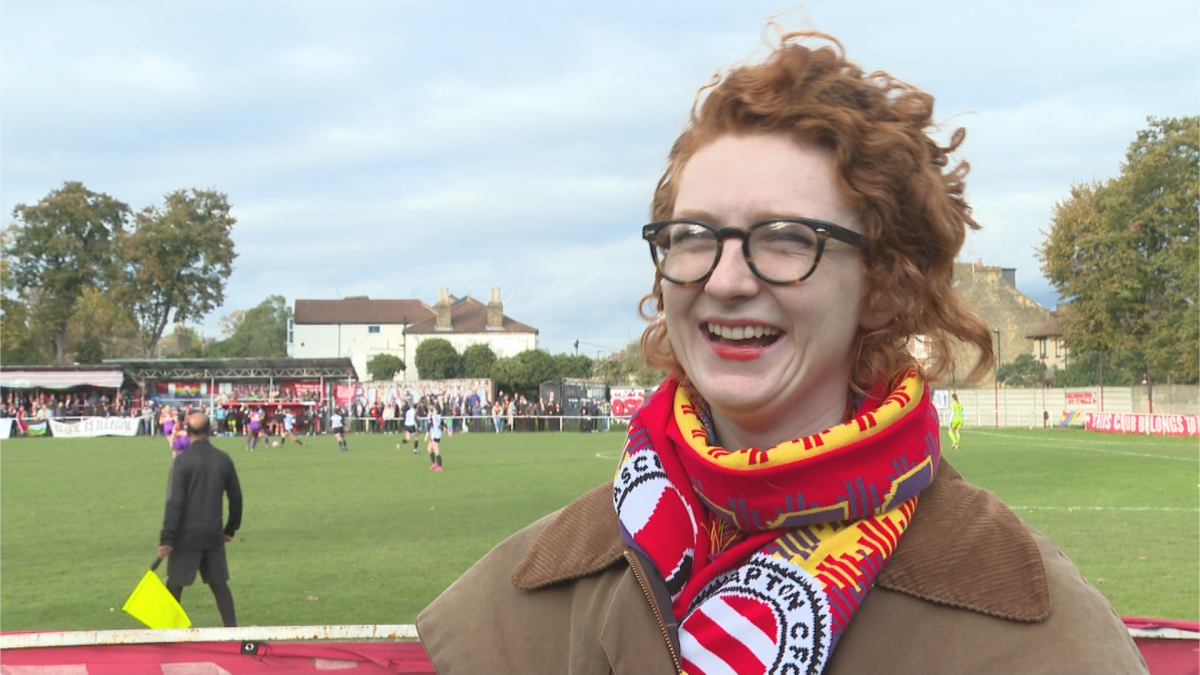As sports venue names go, The Old Spotted Dog is about as romantic as it gets.

London’s oldest senior soccer stadium dates back to 1888, and sits beside the boarded-up, 500-year-old Old Spotted Dog Hunting Lodge, once used by Henry VIII.
The Old Spotted Dog is the home of Clapton Community Football Club (CCFC).
It is part of a growing movement of British soccer clubs where the fans are taking back control and rejecting the world of big-money sports.
Nine divisions above Clapton in England’s intertwined pyramid of football leagues is the multi-billion-dollar Premier League.
Among its leading clubs are Manchester City and Newcastle United, both effectively owned by Middle Eastern oil states.
Other big English teams are owned by foreign billionaires and faceless investment funds.
Their budgets and successes don’t interest Clapton faithful like Sukhdev Johal.
“When these big teams’ fans say, ‘Oh, we won,’ I say, ‘No, no, no, they won, you watched,'” Johal says.
“When we win, we do win because we own the club. We have ownership.”
Johal jokingly refers to himself as a volunteer “dogsbody” and serves as a trustee of The Old Spotted Dog.
He is also among the 1,600 co-owners of CCFC.
Boycott and Rebirth

Get breaking National news
Before CCFC was founded in 2018, many of the team’s current fans followed a different club, confusingly called Clapton FC. It is still run by a London businessman.
After a dispute between him and the fans — partly over rising ticket prices — many supporters boycotted games and eventually set up CCFC as a co-operative.
As part of the project, they started female teams, and made the decision to split all funding equally between women’s and men’s squads.
After Clapton FC lost the lease on the Old Spotted Dog, CCFC moved in and secured financing to buy the site.
The freedom to do so was partly down to an accident of design and the fans’ unashamed left-wing politics.
When CCFC asked members to design a new alternate shirt, the winner was a distinctive purple, yellow and red combo.
“It was the winner because it was a shirt that was in the colours of the Second Spanish Republic; that is the flag of the Republic during the Spanish Civil War,” Johal says on the sidelines of a women’s cup game at the Old Spotted Dog.
“The shirt is an homage to the International Brigades who came from across the globe to support the war against fascism. That fits exactly with the ethos of the club.”
The jersey’s design went viral online, and as soon as CCFC put it up for sale on their website, they recieved a deluge of orders, particularly from people in Spain.
“We sold, in one day, £148,000-worth ($250,000) of sales in shirts. Yes, this is a ‘step-seven’ club, but we sold that many in just one day,” said Johal.
Inclusive Ethos
CCFC also runs “open access teams” for players of all abilities, ages and gender identities.
Those teams play in a non-pressurized environment, but get to wear the exact same kit as the senior teams.
“People might not have kicked a ball ever, and then Clapton will give them a little opportunity to play in a five-a-side league,” says player and volunteer Beth Malcolm.
Her father played professionally, but she never had an outlet to play soccer until she was invited to join CCFC at the age of 26.
CCFC also offers a safe space for trans women to play on female teams, as long as they fulfil the English Football Association’s hormonal and physical requirements for trans players.
“It’s a welcoming club, both on the field and off the field,” says trans player Paula Griffin.
Around The Old Spotted Dog Ground are signs telling fans of the club’s zero-tolerance policy on sexism, racism, harassment, homophobia and transphobia.
Equally inclusive is the ticket price of £4 (C$6.80).
Seniors, refugees, disabled persons and low-income persons are invited to pay whatever they want, without having to show ID.
“It’s a really accessible way to come and see football on the weekends, rather than shelling out £40, or £50-plus to go and see the Premier League games,” says fan Jamie Simkin.
“It’s just like a much more inclusive way to go and see football and it’s a nice sort of antithesis to what the high levels of football have become.”








Comments